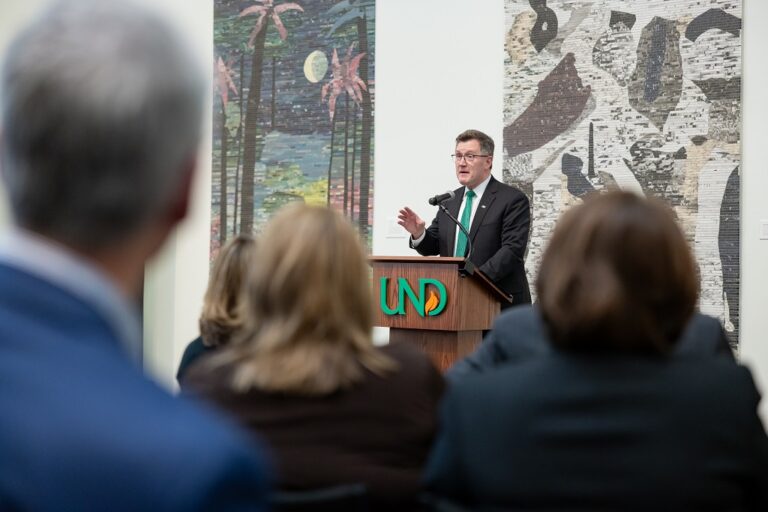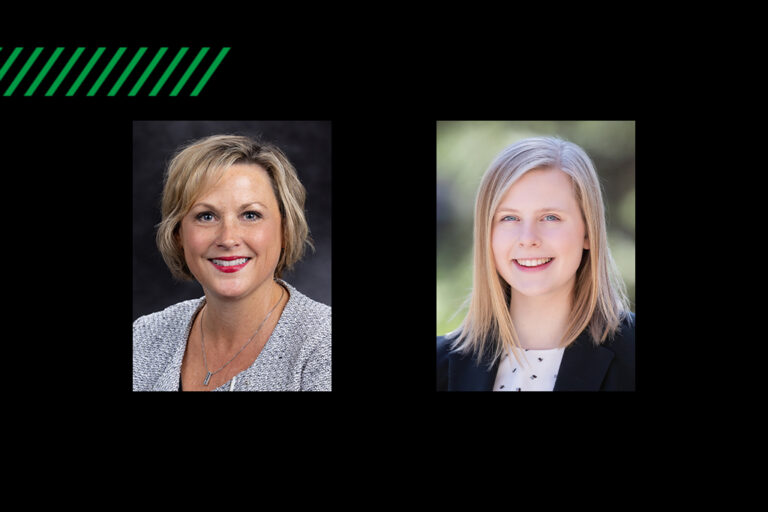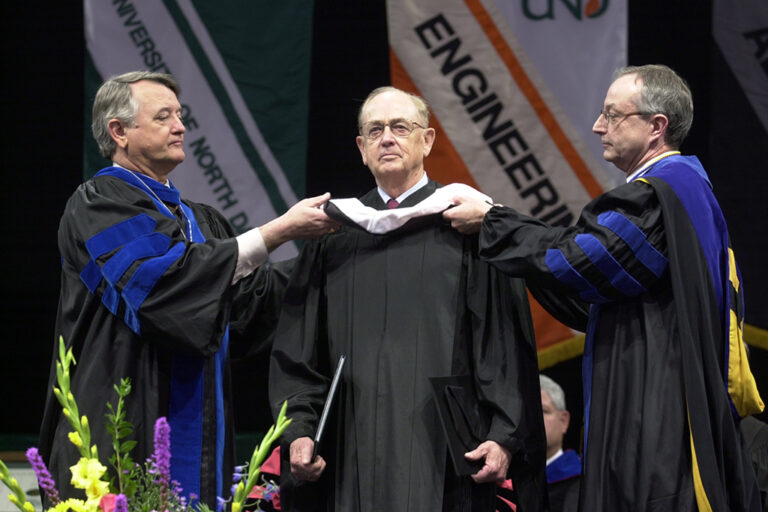Story and video: Q&A with Harold Hamm, UND honorary degree recipient
Continental Resources founder and executive chairman Harold Hamm talks energy, business and advice to students

It was a class in high school that sparked Harold Hamm’s long and prolific career in the oil and gas industry.
The youngest among 13 siblings born in rural southern Oklahoma, the founder and current executive chairman of Continental Resources attended school in Enid in the northern portion of the state.
Perhaps it’s no surprise that it was in Enid where young Hamm nurtured a fascination for the energy sector and the leaders who ran it. After the discovery of oil in the region in the early 20th century, Enid, also famed for its wheat production, boomed. Oilmen “lived big,” said Hamm, but they were also generous with their money and time, investing in the development of the city.
For a distributive education class – a vocational-type course that pairs students and professionals in different trades – Hamm studied the oil executives and entrepreneurs. The more he learned about them, the more he wanted to venture into the oil economy.
“I did an oral report and the more research I did, the more I found about the generosity that went through all the people in oil and gas and all the things that they’ve done for Oklahoma,” Hamm said. “So I was taken by that. I thought, ‘Wow, I want to be a part of that.’”
Hamm set his mind on a career as a petroleum geologist. After high school, he worked in the oil patch to save up for college. There were no grants or scholarships back then, Hamm said.
In the late 1960s, at the age of 21, Hamm founded what would grow into Continental Resources, a Top 10 oil producer in the lower 48 states and a leader in the Bakken in western North Dakota.
Over the years as the company flourished, Hamm heeded the examples set by the oil-industry leaders before him, the ones whose benevolence had impressed him in his teenage years.
According to his biography on Continental Resources’ website, Hamm has donated more than $65 million to combat diabetes. In 2012, he supplied $10 million to establish the Hamm School of Geology and Geological Engineering at the University of North Dakota, in addition to funding various scholarships and awards for education and research.
Last Friday, Hamm received an honorary degree from UND in recognition of his standout career and his support for the University and its students. During that day’s festivities, UND Today caught up with Hamm to talk oil and gas, career inspiration and advice to students.
(The below conversation has been edited for clarity and length.)
How do you feel having just received an honorary degree from UND?
It means a great deal to me having this honorary degree. It makes me very proud. I’m not only proud of the accomplishments here in North Dakota, but I’m also proud for the company and the people at Continental Resources. There’s certainly a lot of work that went on behind the scenes to develop the Bakken. It makes me proud, but the pride that my company personnel are feeling is also very justified. So, I feel good about receiving this from this fine institution.
Also, just thinking about some of the work that’s been done here; the great students here to get training and degrees and what that means to them – there is lots to be proud of.
Your company was instrumental in developing the Bakken oil field and remains a prime player in the region. What was it like in the initial days prospecting for oil in the Bakken?
You know, it is a long story, but I will shorten it. A lot of thin-bedded reservoirs contain a wall of gas, but they don’t give it up for good. They don’t have a lot of permeability. The flow characteristics are not very good. But if you lay a horizontal lateral down in that rock, it can have a great effect and drain what’s in the rock that you couldn’t drain with a vertical well.
We discovered this over some time in the 80s and early 90s in the Cedar Hills field in the Williston Basin. We then started to think about the next big area that this could work in. We mapped a portion of the Bakken field and said, ‘We believe that’s a strong possibility.’ That was so exciting, thinking that that could work, and then watching the application of horizontal drilling bring forth production in areas that you couldn’t produce vertically. So it was tremendously exciting right from the beginning.
What have been some of the biggest challenges in growing Continental Resources over the years?
This industry is said to be very cyclical, and it is true. We are into a cycle now that’s influenced by the coronavirus; demand may be slacking off for the immediate future. So, you see lower commodity prices. And our industry’s had a history of that.
So, some of the biggest challenges that we’ve had in the past happen when we don’t have support for commodity prices. And, sometimes it’s for an extended period of time. This time, I think it’d be very short term. But in the past, we’ve seen times that it would last a year or more. And so challenges with commodity prices are probably the biggest thing over the history of our company.
This company, of course, started from scratch, basically. It required building it one person at a time, one prospect at a time, one well at a time. That in itself is challenging.

What advice do you have for students pursuing careers in the petroleum industry?
Probably the same advice that I would have had for anybody at a time during my career, and that is just know that there will be challenges. But we’re going to be using oil and natural gas for the next 50 years. We need these clean burning fuels like natural gas in the future.
We’ve seen a wonderful thing happen since 2006. We’ve moved back the degree of pollution in the air some 15 percent with just a matter of clean-burning natural gas. So, it’s a great future, and young people just have to know that. I know they’re tying up everything that they’ve got in their career, getting the preparation and training.
Just be optimistic and know that oil and gas will be here for a very long time, and they’re needed.
You not only helped establish the Hamm School of Geology and Geology Engineering, you have continuously provided financial support to students. Why is it important for you to do so?
We need these young people. There’s a generation – including myself – that’s going to go away before you know it. So, we need a lot of new people in this sector.
And also, there’s a lot of work to be done. We talked about recovery of oil in the Bakken. You know, today with the best methods we have, we can recover maybe 20 percent of the original oil in place. We need that number to go to 40 percent or 50 percent. And it’s going to have to be done with secondary and tertiary methods of recovery. And right now, we don’t know the best way to do that. And it’s very important for these young minds to be trained to help us in figuring that out.
So there’s a lot of work yet to be done.
What should research focus on?
There’s a lot to be focused on. Carbon dioxide can be very important for secondary and tertiary recovery and to take the gas out of the air, reinject it under the earth where it never surfaces again but provides the energy to drive the production of oil. How good is that? So that is just one area, and there are so many others areas in energy production that can be focused on.
And, UND is leading some of these efforts. It’s the right place to make these things happen.
What is it like being on UND’s campus, meeting students who benefit from your generosity?
I am probably inspired more by students than anything else. These young folks who are here spend a lot of time working hard to get the education they need to pursue their dreams. That’s very inspiring to me. So, hopefully, I can provide some inspiration back to them. There’s a lot to be inspired about on the campus of UND.
With that, do you have any parting words of wisdom for students?
Work hard. Don’t pay too much attention to the noise. There’s always going to be noise – different things going on. Stay the course. Keep doing what you’re doing. Get the education; education freed me up from the poverty cycle. It will you, too.


